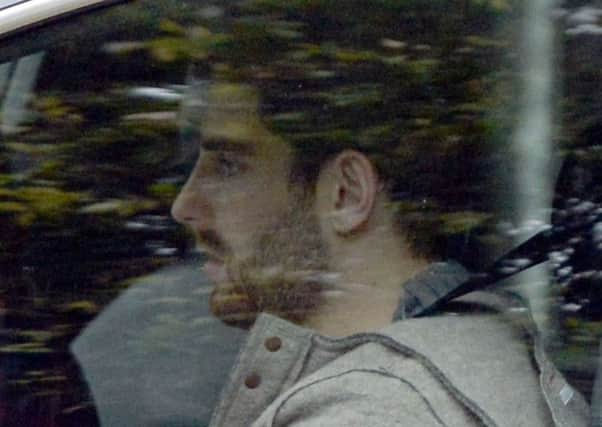Dani Garavelli: Ched Evans case causes shockwaves


The rape carried out by former Sheffield United striker Ched Evans is one such case.
What Evans did was vile, even by footballing standards; one night in May 2011, while visiting Rhyl, he booked a hotel room for his friend Clayton McDonald in the hope that one or other of them might bring a woman – any woman – back for sex. Sure enough, after a night of clubbing, the victim – already drunk – staggered into McDonald’s path before apparently agreeing to get in a taxi and go to his hotel room. Once there, they started having sex.
Advertisement
Hide AdAdvertisement
Hide AdEvans’ first contact with the woman involved stepping over her after she fell outside a kebab shop. His second was when he pitched up to the hotel room and joined in. McDonald was cleared of rape, but Evans was convicted after the jury decided the woman was incapable of consent. He served half of a five-year sentence before being released on licence.
With most crimes – however heinous – our distress at the knowledge anyone is capable of carrying them out is tempered by a sense that the perpetrator exists outside of social norms. We can be fairly sure as we watch a serial killer convicted that the vast majority of people share our disgust and sense of justice (or injustice) at the jail sentence handed out. This solidarity in the face of brutality goes some way to reassert the natural order. But it does not apply to Evans.
From the moment he was arrested, a sizeable number of men and women put themselves in his corner. Though a jury found him guilty, they protest his innocence. Though he has never admitted guilt or expressed remorse, they argue he should be allowed to return to his club. In the early days, they trolled his victim – calling her a liar and naming her online so she was forced to take on a new identity. More recently, they have directed their anger towards those who have tried to block his return to Sheffield United.
The three people who last week resigned as club patrons – TV presenter Charlie Webster, businesswoman Lindsay Graham and former pop star Dave Berry – have all been targets of online abuse, and Jessica-Ennis Hill, who said she’d want her name removed from the stand if he were allowed to re-sign, has received rape threats.
Lending support is a different breed of defender, whose misogyny is wrapped up in a more sophisticated package. They say: “The only people who know what happened in that room are the two men and they say she consented.” (Well, the jury thought different.) They say: “If she was so drunk, how come she could talk.” (She was heard slurring her words.) They say: “Those who serve their time should be allowed to rejoin society.” (Maybe, but there’s no automatic entitlement to a top job at the heart of the community.)
Crowning it all is the Professional Football Association, which has backed a return to training, and Sheffield United, which has vacillated over Evans’ possible re-signing, while nevertheless trying to claim the moral high ground. “There is no place for mob justice,” a spokesman said sanctimoniously, although the so-called mob includes club sponsors and former sports minister and United fan Richard Caborn.
The inescapable conclusion to be drawn from all this is that, far from becoming more enlightened in its attitude towards rape, sections of society are moving backwards.
There is apparently a sizeable number of men and women who buy into every rape myth going. They do not see anything wrong with taking a woman, so drunk she can’t walk, straight back for sex. They struggle with the concept of consent and they victim-blame. It’s always, “Why was she dressed like that?”, “Why did she drink so much?” and “What did she expect if she went back to the hotel?” It’s never, “Why didn’t he ask her if she was all right?” or “Why did he just not rape her?”
Advertisement
Hide AdAdvertisement
Hide AdAll this is not to let those on the other side of the fault line off the hook; the Evans’ case has also revealed a degree of fundamentalism among anti-rape campaigners. It was, of course, disappointing to hear Judy Finnigan say Evans should get his job back because there was no violence in his crime. But telling her daughter Chloe “Judy’s given me her blessing to rape you” is no more acceptable than trolling done in Evans’ defence.
There seems to be a move to shut down any discussion of the finer points of the case; for example, it seems reasonable to question why McDonald was acquitted and Evans wasn’t, given she had consumed the same amount of alcohol when having sex with each of them. But saying so in the wrong company is liable to see you branded a rape apologist.
Much as I want rape myths debunked, I don’t want to live in a world where people can’t express their reservations without being shot down. I want to counter ignorance with reasoned argument because it might bring about a culture shift as a opposed to a backlash.
And we do desperately need a culture shift. If we are to reach a stage where men stop haggling over exactly how drunk a woman must be before she is incapable of consenting and start treating her with the respect she deserves, we need a revolution. «
• Twitter: @DaniGaravelli1